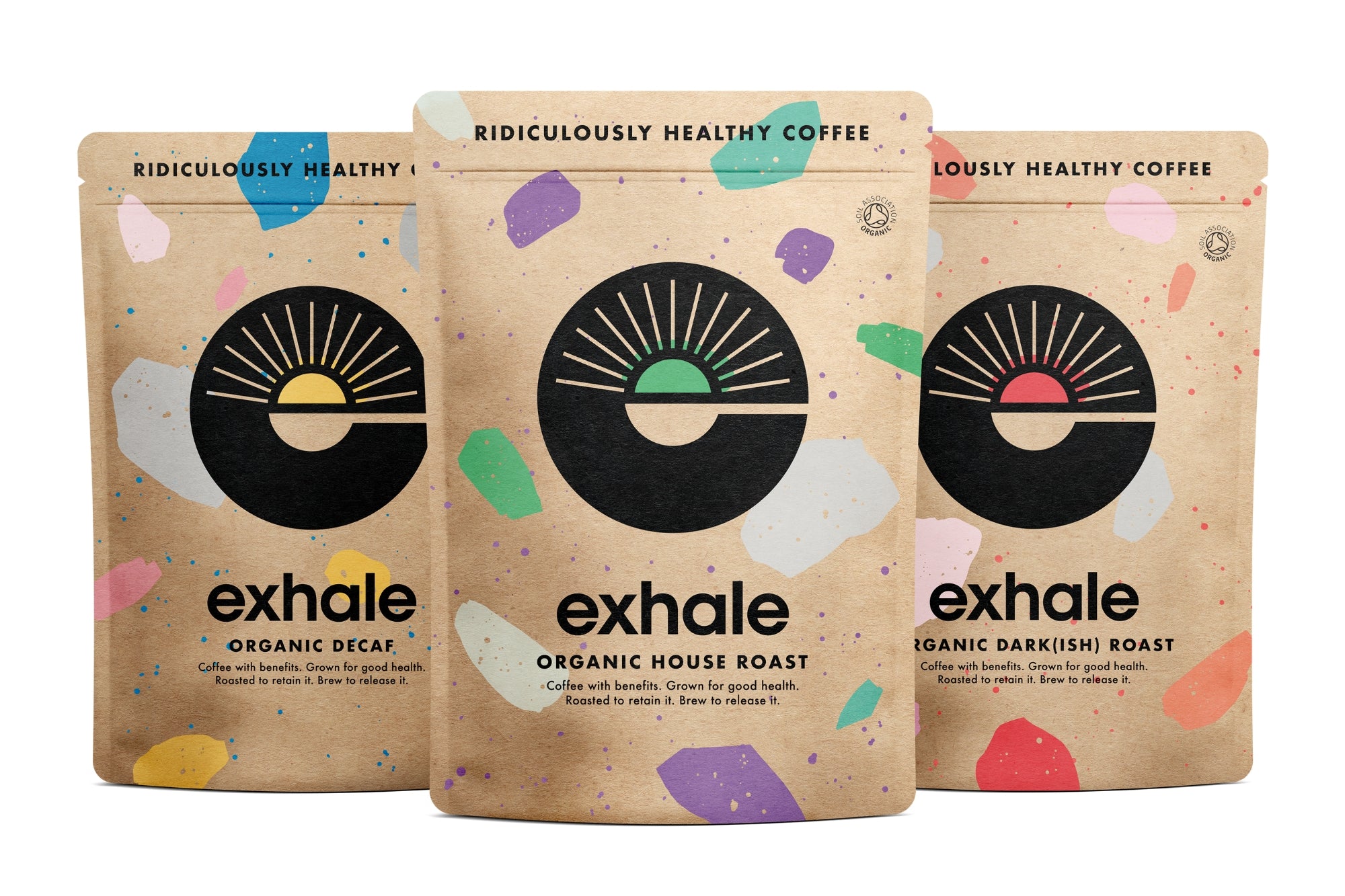UPDATED: 20th June 2025
If you drink a lot of coffee (guilty), and read a lot about health (also guilty)—then you might have heard the buzz about mycotoxins in coffee, and the potential risk they pose to your health.
(if you haven’t head about them, perhaps you should stop reading now… because ignorance can be bliss!)

What is a mycotoxin?
Mycotoxins are toxic compounds that are produced by moulds in food and are considered a 'substantial issue in the context of food safety, due to their acute and chronic toxic effects on animals and humans'. (1)
They can be found in common crops and foods that are kept dried and stored for long periods of time. For example, grains, peanuts, rice, that kind of thing. Lots of things you’ve got in your kitchen at this very moment. Yes, including coffee beans.
This, reasonably, could be a bit of a concern. Especially around chronic illnesses that can be caused by exposure to mould.
But, are mycotoxins worth getting your knickers in a twist over?

Mycotoxins and health risks
Let’s see what the World Health Organisation (WHO) have to say about them:
“Mycotoxins can cause a variety of adverse health effects and pose a serious health threat to humans.
The adverse health effects of mycotoxins range from acute poisoning to long-term effects such as immune deficiency and cancer.
Exposure to mycotoxins needs to be kept as low as possible to protect the people.”
Yikes.
Otherwise one particular mycotoxin, Ochratoxin A (OTA), has been shown to be nephrotoxic, hepatotoxic, teratogenic, and immunotoxic in various species and was classified by the International Agency for Research on Cancer (IARC) as possibly carcinogenic to humans (group 2B) in 1993. (2)
The kind of moulds that produce mycotoxins are everywhere and are also naturally occurring, which makes them difficult to avoid. But don’t go locking yourself in a sterile bubble just yet… the good news is studies have found that we humans do have a tolerance for some mycotoxins. And they’re only toxic if they’re consumed in large quantities. (3)
There are also guidelines and testing procedures in place in over 100 countries (4) to ensure that those limits are not exceeded. So as long as your exposure to them is low, our bodies have got us covered and mycotoxins are neutralised by the liver and don’t stockpile in the body. (5)
The key takeaway here is they're pretty damn nasty, but your body has you covered if you make sure your exposure remains low.
The EU just made the limits much stricter - and that changes everything
Here's something that wasn't widely reported but is absolutely crucial: in August 2022, the European Union dramatically tightened the safety limits for Ochratoxin A in coffee. The new regulations, which came into effect in January 2023, essentially halved the previous limits (6):
- For roasted coffee: reduced from 5.0 µg/kg to 3.0 µg/kg
- For instant coffee: reduced from 10.0 µg/kg to 5.0 µg/kg
Why the sudden change? The European Food Safety Authority (EFSA) updated their scientific opinion on OTA, based on a report they had sat on for two years highlighting data on its genotoxicity (i.e. its ability to directly damage DNA).
This regulatory shift fundamentally changes how we should interpret all the previous research that concluded coffee was "safe" regarding mycotoxins.
Most coffee would now fail the new safety standards
When you look at studies published since 2010 through the lens of these new, stricter limits, the picture becomes more worrying:
In fact, a global analysis found that the average pooled concentration of OTA in coffee worldwide is 3.21 µg/kg - which already exceeds the new EU limit of 3.0 µg/kg for roasted coffee (8).
This means that past conclusions of "no risk to human health" for coffee consumption, which were often based on compliance with the older, higher limits, are now outdated under the new, stricter guidelines.
Are mycotoxins an issue in coffee?
Several studies have shown Aflatoxin B1 and Ochratoxin A to be present in coffee so these are the ones of particular interest to us.
Let’s see what our friends at the World Health Organisation say again:
“Ochratoxin A is is often found in coffee beans. Ochratoxin A is formed during the storage of crops and is known to cause a number of toxic effects in animal species. The most sensitive and notable effect is kidney damage, but the toxin may also have effects on fetal development and on the immune system.”

What does the research say? We dove into the science and found mostly worrying, but at least some more reassuring results:
- 91.7% of green coffee beans were 'contaminated with moulds' in a study on 60 samples from Brazil. 33.3% were contaminated with OTA, but all at levels lower than the EU deems 'safe'. (9).
- 45% of coffee brewed from commercially available coffee beans contained OTA (10). The study concluded 'regular coffee consumption may contribute to exposure of humans to OTA'
- Roasting reduces the levels of Aflatoxins by 42–55%, but even after roasting Aflatoxins were detected in 55% of ground roasted coffee beans (11).
- 27% of roasted coffees contained OTA - 5x as many as was in wine and 3x that in beer, but less than was found in Chili. (12).
- However, another study concluded that 'no evidence was identified from historical data to suggest OTA is acutely toxic in humans from coffee consumption' and that mycotoxins could be destroyed with heat when boiling. (13)
One recent study from 2019 showed especially worrying results.(14) It tested 51 roasted coffee's from France, Germany and Guatemala and found:
- 12% of our TOTAL exposure to OTA comes from drinking coffee alone!
- OTA was detected in all but 2 coffee samples, some at 4 or 5 times the safe legal limit set by the EU!!!
- They also noted that 'Interestingly, the three analyzed organic coffee powders... were among the coffee samples with the lowest detected OTA levels.' - showing that if you don't plan on buying a lab tested coffee like Exhale coffee then at least buying organic is a good start.
Roasting and brewing don't eliminate the problem
A common misconception is that roasting effectively eliminates mycotoxins from coffee. While roasting does reduce mycotoxin levels, it's crucial to understand that it doesn't eradicate them entirely, and a significant portion can still make its way into your final cup.
- · Ochratoxin A: Early research suggested "only a small reduction" in OTA during roasting (15). However, other studies indicate more significant reductions, ranging from 69% to 96% (16). A more recent study found that OTA reductions due to roasting alone varied between 15% (for a light roast) and 57% (for a dark roast) (19). The mechanisms contributing to this reduction include physical removal with chaff, isomerization into less toxic forms, and thermal degradation, potentially involving moisture (21).
- · Aflatoxins (AFs): Roasting has been shown to reduce aflatoxin levels by 42–55% (17). Another study reported AFs reductions ranging from 32% (light roast) to 62% (dark roast) from roasting alone (19).
We can conclude from this that roasting does indeed reduce the levels of mycotoxins, but it far from eliminates them. But the most concerning part is that despite the reductions achieved during roasting, mycotoxins can, and often do, transfer into the final brewed coffee, presenting a direct route of exposure for consumers.
- · OTA has been explicitly found to be "eluted into the brew" (15). In one study, OTA was detected in 18 out of 40 (45%) commercial coffee brews, with concentrations ranging from 0.4 to 7.8 µg/kg equivalent ground coffee (15).
- · The percentage of OTA that passes into the beverage can vary widely, from 20% to as high as 140% of the initial amount found in the ground coffee. Some "recoveries over 100%" have been attributed to analytical interferences, such as the formation of open-ring OTA or the presence of the non-chlorinated analogue OTB, highlighting the complexity of accurate quantification (18).
- · Other research shows the brewing of roasted coffee provides further, albeit variable, reduction: 7.28% to 43.57% for OTA and 0.86% to 10.19% for Afs (19).
- · Overall, the combined effect of roasting and brewing can lead to total reductions from initial green bean levels of 58.74% to 64.70% for OTA, and 40.18% to 62.38% for Afs (19).
- · Despite these processing-induced reductions, evidence confirms that mycotoxins are present in a large percentage of coffee beans and ultimately make their way into the final drink (17). One study specifically notes that more than 80% of OTA is extracted during coffee preparation (20).
This means that even with processing, your final brewed cup of coffee can still be a source of exposure, making initial contamination levels in green beans critically important. You can't rely on roasting as your sole protection against mycotoxins.
How can coffee get contaminated by mycotoxins?
Every stage of a coffee’s lifecycle could introduce moulds and mycotoxins and needs to be carefully controlled. For example at the farm, when coffee cherries are washed and de-pulped. In humid tropical conditions, cherries contain enough water to support mould growth and OTA formation during the initial 3-5 days of drying on the outer part of the cherries.(22)

Also while at the farm, soil and surfaces and equipment in the drying yard can cause fungi infection post-harvest.
After leaving the farm, the transport of green coffee is one of the most critical phases in coffee handling. Condensation might happen during transport which can lead to fungal growth.
Green coffee storage is also important because green coffee is very hygroscopic meaning it can reabsorb moisture from the environment. High temperatures and humidity favor fungi growth, increasing the probability of mycotoxins. Studies recommend the below limits for no mould growth:
- Coffee should contain a maximum of 12–14% moisture
- Controlling the relative humidity between 50 and 75%
- Not exceeding 26 °C
On a side, these are also the reasons at Exhale we don’t recommend storing coffee in the fridge, because of the humidity and the moulds floating around in there. Our lovely coffee will absorb them quicker than you can say the words ‘lab tested’.
Who in particular should minimize or avoid mycotoxins? And under what conditions?
Here’s what Alex Manos, Institute for Functional Medicine Certified Practitioner and Exhale’s Chief Wellness Officer, had to say:
“We should all actively reduce our exposure and intake of mycotoxins! Those with chronic health conditions (yes that’s a long list!) should be extra mindful - in particular those with kidney and liver disease. But don’t worry we have you covered. At Exhale we test for these mycotoxins, among other potential toxins such as pesticides and herbicides”

A nice point about mycotoxins and our toxic burden was made by Dr. Jill Carnahan:
"In my opinion, toxin burden is THE biggest cause of declining health and accelerated aging today, so you might want to care anyway. The thing about toxin burden is it’s all about how it adds up within your body. Sure, there might be just a little mold in your coffee but add that to the 84,000 chemicals you’re exposed to each day and you’ve got a big problem. It’s up to you to decide where and how you’ll reduce your chemical burden – but one thing is for sure, we all need to work to reduce the amount of chemicals we’re exposed to.”
How do you avoid a coffee that’s high in mycotoxins?
The way to avoid them at the farm is through good farming practices and drying, grading, transportation and storage techniques—at Exhale we only buy from Organic, Speciality Grade coffee farms which you can read more about in our specialty coffee blog.

We then independently lab test for moulds and yeasts, aflatoxins and ochratoxins. These are 3 separate tests and you can check out our certificates for our last crop here:
- Exhale Coffee’s mound and yeast test
- Exhale Coffee’s Aflatoxins Test
- Exhale Coffee’s Ochratoxin A Test
We also take other steps to reduce the chance of contamination such as only buying coffee that’s been hermetically sealed at source in GrainPro sacks to keep any contaminants out. Then the green beans are stored in a temperature controlled, dimly lit warehouse.
Our coffee's are processed using the 'washed' method which leaves the beans out in humid environments, exposed to contamination, for a fraction of the time compared to other methods.
Importantly we roast, grind and post fresh weekly so there’s less chance of contamination and of coffee staling. Most supermarket coffees are roasted then ground months before they ever reach your home leaving them stale and open to contamination for longer (aside from the fact they’ll have lost their delicious smell and sensational taste long before you get to drink them).
You can check out our full range of lab tested coffee's and read about the 8 other independent lab tests we have on our coffee here

So, should you be worried about mycotoxins in coffee?
Having now taken the time to thoroughly research this topic, including the recent regulatory changes, I'm even more convinced that mycotoxins in coffee are a legitimate concern that shouldn't be dismissed.
The EU's decision to halve the safety limits wasn't made lightly - it was based on new scientific evidence about OTA's ability to damage DNA directly. When regulatory bodies take such dramatic action, halving the 'safe' limits, it shows the previous standards weren't protective enough.
The fact that the global average for OTA in coffee now exceeds the new EU safety limit is particularly telling. This means a substantial portion of the global coffee supply would not meet these stricter standards and could therefore pose a serious risk to your health, especially when consumed daily, in large quantities, for decades! I personally drink close to a litre of coffee a day between my 3 mugs and have done for 10 years… that could have been a LOT of mycotoxins if I didn’t drink lab tested, mycotoxin-free Exhale!
Mycotoxins are omnipresent, they're found everywhere. But unlike many other unavoidable environmental toxins, this is one area where you actually have control. You can choose to drink coffee that's been independently lab tested to be mycotoxin-free.
As Alex Manos concluded: "If you can receive a lab tested, mycotoxin free coffee, delivered to your home on a weekly basis, why wouldn't you. With many health professionals realising that our toxic burden is one of the most significant factors contributing to the rapidly declining health we see today, a simple swap of your coffee is a no brainer if you ask me".
The science is clear: mycotoxins pose real health risks, the regulatory landscape is tightening, and most coffee contains detectable levels. In a world where we're exposed to thousands of chemicals daily, choosing a clean, tested coffee is one simple step you can take to reduce your toxic burden. It feels like a no-brainer to me.
Check out our full range of healthy, clean, organic coffees here. All independently lab
References:
- https://pubmed.ncbi.nlm.nih.gov/29412472/
- https://pubmed.ncbi.nlm.nih.gov/27384585/
- https://pubmed.ncbi.nlm.nih.gov/30812330/
- https://pubmed.ncbi.nlm.nih.gov/17508207/
- https://www.healthline.com/nutrition/the-mycotoxins-in-coffee-myth#mycotoxins
- https://eur-lex.europa.eu/legal-content/EN/TXT/PDF/?uri=CELEX:32022R1370
- https://pubmed.ncbi.nlm.nih.gov/37649524/
- https://pubmed.ncbi.nlm.nih.gov/31345415/
- https://www.ncbi.nlm.nih.gov/pubmed/14726276
- https://www.ncbi.nlm.nih.gov/pubmed/7759018
- http://pubs.acs.org/doi/abs/10.1021/jf011338v
- https://www.ncbi.nlm.nih.gov/pubmed/24152987
- https://pubmed.ncbi.nlm.nih.gov/34642959/
- https://www.ncbi.nlm.nih.gov/pmc/articles/PMC6628416/
-
https://pubmed.ncbi.nlm.nih.gov/7759018/
- https://pubmed.ncbi.nlm.nih.gov/11600012/
- PLoS One. 2021 Oct 29;16(10):e0259302. doi: 10.1371/journal.pone.0259302
- https://pmc.ncbi.nlm.nih.gov/articles/PMC3153291/
- https://pmc.ncbi.nlm.nih.gov/articles/PMC8555823
- https://pubmed.ncbi.nlm.nih.gov/39621808/
- https://pubmed.ncbi.nlm.nih.gov/12113660/
- https://www.researchgate.net/publication/282595242_Chapter_25_Mycotoxins_in_Coffee






3 comments
Simon Biggs
A detailed article with a lot of information to digest. On the one hand we have the micro toxic burden that can build up from a variety of sources. On the other hand we have a barrage of tests designed to detect these and either remove or avoid them. Then we have the bodies own ability to deal with lower levels of toxins. I read much about the dangers to life of modern life. Indeed living seems to be the biggest threat to life there is if we take on board the plethora of substances that can cause us harm not to mention the 84000 chemicals we are exposed to each day.
I tend to approach life from the point of everything in moderation, some things more than others. I must admit that I skim read the article being short of time, and I’m not the best at skim reading. I would have been very interested to see the effect on toxins of making instant coffee. I know this is no place for instant coffee but to be honest, it’s the jar of coffee found in almost all kitchens, offices and many other places coffee is consumed.
Which ever way you look at this, the best way to deal with it is to just drink exhale coffee. Let’s be honest, if you can get a coffee with all the obvious health benefits that exhale coffee has, why wouldn’t you drink it most of the time.
Please continue to bring to our attention studies of this type and any other research into coffee, good and bad. It’s good to be informed, how else can we make choices that are meaningful.
Zach
Do you lab test each batch for all possible mycotoxins? How many kg is one batch and is the whole batch all in the same container/ bag when it arrives? How often is the lab result positive in %?
Clare
When you do your testing, how often do you find mycotoxins or other toxins that means the batch fails QC?
Leave a comment
All comments are moderated before being published.
This site is protected by hCaptcha and the hCaptcha Privacy Policy and Terms of Service apply.